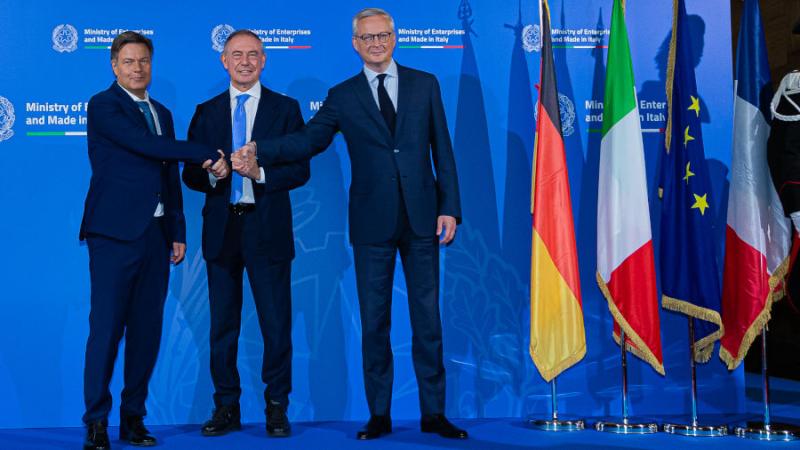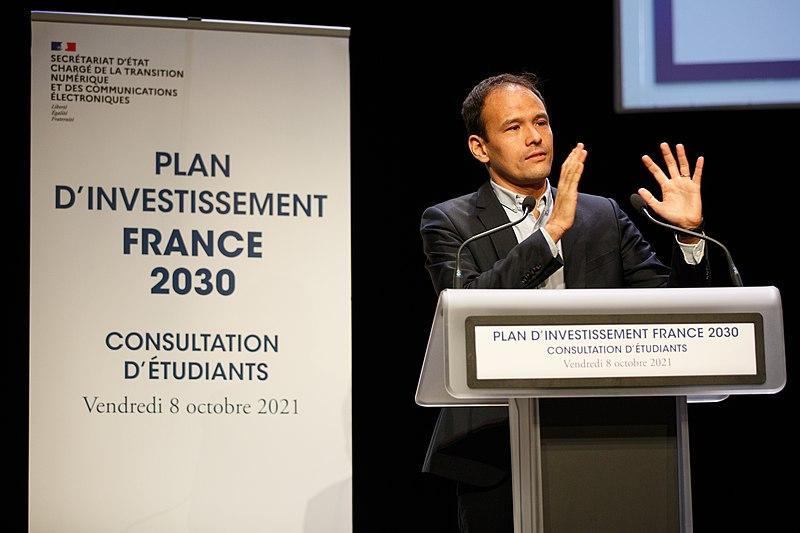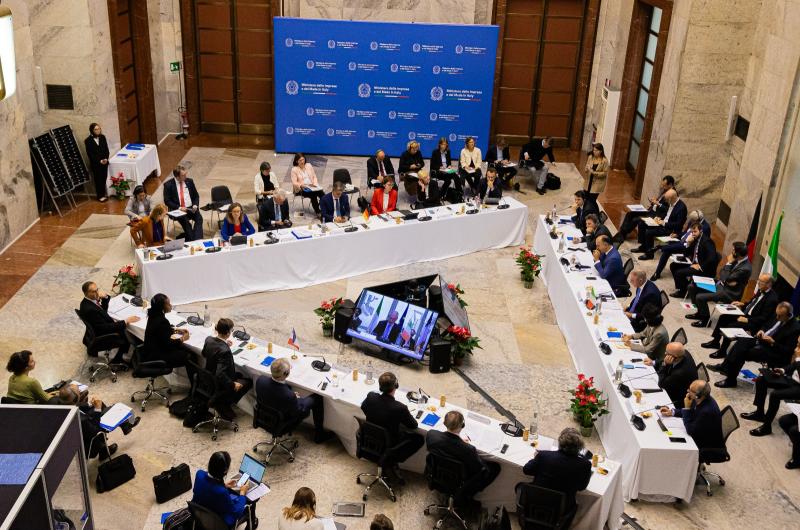
Trojan horses: how European startups teamed up with Big Tech to gut the AI Act
The European Parliament is set to approve the Artificial Intelligence Act on 13 March 2024. New research reveals how European startups Mistral AI and Aleph Alpha, together with Big Tech, successfully captured the policy-making process, and undermined the AI Act.
In December 2023, after 36 hours of difficult behind-closed-doors negotiations, the European Parliament and the member states reached a final deal on the AI Act. But while the details of that deal remained murky for weeks to follow, it quickly became clear that the developers of the most advanced AI systems –that is, the Big Tech companies – had scored a major victory.
These systems known as general-purpose AI – for example ChatGPT – can be used for a wide range of purposes. The systems are often complex and behave in ways that can surprise even their developers. General-purpose AI is trained on societal data and if the data carry structural biases – from racism to ableism and more – these risks are baked into the systems. Because of these risks, the European Parliament moved in June 2023 to impose certain obligations on companies developing these systems.
From that moment, Big Tech began a large-scale lobbying offensive targeting the European Commission and EU member states. Chief executives of Google, OpenAI, and Microsoft all shuttled to Europe to meet policy-makers at the highest level, including Commission members and heads of state. Google’s Chief Executive Officer, Sundar Pichai even managed to meet three commissioners in just one day. These companies were so present, that they drowned out other voices from academia or civil society. In 2023, 78 percent of meetings on AI of high-level commission officials were with corporate interests.
It was however the lobbying by respectively, French startup Mistral AI, and the German startup Aleph Alpha, which tipped the scales. As documented by lobby watchdogs Observatoire des Multinationales, and LobbyControl, these companies had privileged access to the highest levels of decision-making, leveraging the two member states France and Germany to dilute any requirements on developers of general-purpose AI under the pretense of “creating European champions”.
"In its final form, the AI Act is perfectly manageable for us", Arthur Mensch, co-founder and director of Mistral AI, said in a recent interview with Le Monde. Meanwhile Aleph Alpha boss Jonas Andrulis was even more direct: "The current version of the AI Act is fine. A lot of work led to significant improvements on the finish line."
Through the revolving door: from secretary of state to Mistral AI’s lobbyist
The French company Mistral AI played a key role in this offensive against the AI Act. Despite only being founded in April 2023 and with just 22 employees, it gained access to the highest level of decision-making. Just over two months after its creation, Mistral AI representatives had already met with Roberto Viola, the head of DG Connect, to discuss generative AI.
"For the first time of my life I had the opportunity to say something one week and see the highest instance of the state make an announcement based on that the next week."
Stanislas Polu, founder of the French AI company Dust
Mistral AI, along with another French startup Dust, was also invited to the Elysée Palace to have dinner with French President Macron, which seems to have been highly effective in influencing the French position. Stanislas Polu, the founder of the AI company Dust, wrote on Twitter following the meeting that “for the first time of my life I had the opportunity to say something one week and see the highest instance of the state make an announcement based on that the next week”.
Mistral AI’s main lobbyist Cédric O in particular played an outsized role in influencing the French position on the AI Act. As the former Secretary of State for Digital Transition, Cédric O has the ear of the French President. Cédric O was also one of the initiators (with René Obermann, the Chair of the Board of Directors of aerospace and defence giant Airbus, and Jeannette zu Fürstenberg, founding partner of the tech venture fund La Famiglia) of an open letter signed by 150 European companies claiming the AI Act “would jeopardise Europe’s competitiveness and technological sovereignty”. However in 2022, as Secretary of State, O’s views were completely different. At a tech conference in New York he called for a different legislative framework for artificial intelligence in Europe, saying: "As far as I’m concerned, we need more regulation. So if the price to pay is to have a different framework in the US and the EU, I would go for that”.
"As far as I’m concerned, we need more regulation."
Cédric O when he was still Secretary of State

Along with the Chief Executive Officer of Mistral AI, Arthur Mensch, O is also a member of a controversial advisory committee on generative artificial intelligence set up by former French Prime Minister Élisabeth Borne. Other members of the group include Big Tech companies Meta and Google, and French industrial giants such as Renault and Dassault Systems.
O’s conflict of interest has not passed unnoticed and has raised criticism among French senators. After his term as Secretary of State O was forbidden by the French High Authority for Transparency in Public Life (HATVP) to lobby his former colleagues in the French Government or own shares in tech companies. O’s shares in Mistral AI have reportedly earned him 23 million euros.
Aleph Alpha’s well-connected network
Similarly, Aleph Alpha has enjoyed easy access to German policy-makers. Between June and November 2023, the German startup had 12 meetings with ministers and state secretaries including Prime Minister Scholz, the Minister for Economic Affairs Habeck, and the Minister for Digital Affairs Wissing. The founder of Aleph Alpha, Jonas Andrulis, was invited to the cabinet retreat in Meseberg in August 2023, where he met the entire German Government.
Aleph Alpha’s lobby papers obtained by LobbyControl show that the company insisted that AI models should not be regulated, only the application of those models; a point that was picked up by the German Government.
In August 2023, the founder of Aleph Alpha, Jonas Andrulis, was invited to the cabinet retreat in Meseberg, where he met the entire German Government.
This lobbying offensive culminated in a high-level summit in October, where French, German, and Italian officials met with representatives from the tech industry to discuss industrial cooperation on AI. In a public statement following the summit, the German Economy Minister, Robert Habeck, sounded like a tech spokesperson: "We need an innovation-friendly regulation on AI, including general purpose AI." Habeck stressed the risk-based approach of the AI Act, echoing a Big Tech talking point about avoid regulating the development of foundation models.
This French-German-Italian front proved largely successful. After a grueling 36-hour meeting in December '23 between the EU Parliament and member states most of the binding obligations proposed by the Parliament – such as fundamental rights checks – were deleted and only a set of transparency rules remains. Only general-purpose AI systems that meet a certain threshold of computing power used for training an AI system will have to meet higher obligations. However, at the moment, GPT4 is the only AI system in the world that meets this threshold.

Doing the dirty work of Big Tech
When the company OpenAI released the chatbot ChatGPT at the end of 2022, it triggered a great deal of AI hype worldwide. Just a few months later, Google published its own foundation model BARD, which was later renamed Gemini. European AI startups such as Aleph Alpha also suddenly found themselves on the upswing and were able to use the hype to raise millions in private funding.
European politicians were apprehensive of missing out to American competitors in this field. In an internal memo in April 2023, the German Economy Ministry BMWK recommended "making the BMWK visible" in the field of AI because of the broad media coverage.
Mistral AI and Aleph Alpha have continuously stressed the need to support the European AI industry to keep up with the tech companies in the USA and China. A standard talking point was that the AI Act would kill innovation and make a ‘sovereign’ European AI industry impossible.
This narrative is now being questioned following the announcement in February 2024 that Mistral AI will partner up with Microsoft, with the latter investing €15 million. Mistral AI's models will be trained and distributed on the American giant's servers, as part of an arrangement reminiscent of Microsoft's deal with OpenAI – albeit on a much smaller scale at this stage.
The lobbying efforts of Microsoft, Google and other Big Tech giants had waned towards the end of the negotiations, as Mistral had actually done the "dirty work" for them.
The tech journalist Luca Bertuzzi has raised the question if this deal was already in the pipeline when the AI Act was being negotiated. According to Bertuzzi, many of those involved in the AI Act noticed that the lobbying efforts of Microsoft, Google and other Big Tech giants had waned towards the end of the negotiations, as Mistral had actually done the "dirty work" for them.
In response, Green MEPs have asked European Commissioners Thierry Breton and Margrethe Vestager to examine whether Mistral AI has been used as a front for Microsoft's lobbying, in breach of the rules on lobbying transparency and the prevention of conflicts of interest. Additionally, the EU Commission has announced it will investigate the partnership for potentially being in breach of EU competition rules.
The devil is in the details
The privileged access that companies like Mistral AI and Aleph Alpha enjoy with key decision-makers – and the glaring absence of critical, independent, and alternative viewpoints – are all the more worrying given that the work of regulating artificial intelligence has only just begun. Once the slimmed-down version of the AI Act has been adopted, it will have to be implemented. In such a technical field, and with rules offering so much scope for interpretation, this will be no mean feat.
Arthur Mensch from Mistral AI has already announced his opposition to some of these rules. In an interview, he said that the AI Act should not force him to disclose business secrets, which would compromise know-how and competitiveness. The German ministry responsible for the implementation of the AI Act has also announced that it will work towards a low-bureaucracy and innovation-friendly solution.
Important rules for artificial intelligence must not be sacrificed in favor of corporate profits. But that seems to be exactly what is happening.
Read the article by Observatoire des Multinationales here, and the article by LobbyControl here.
